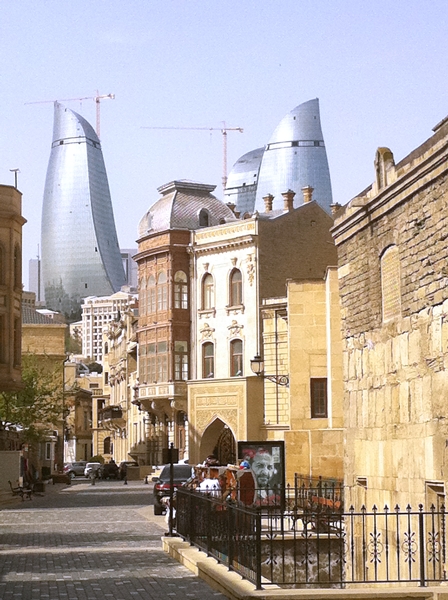BP and its local Azeri partner SOCAR have been contracted to exploit the Azeri Shah Dinaz gas field. SOCAR is state owned and was founded in 1993. It boasts around 60,000 employees on its books. Over the next few years work will begin on Shah Deniz II which is expected to yield around 16 billion cubic meters of natural gas per annum.
6 billion are already destined for Turkey with the remaining 10 billion heading to Europe. By 2025, extracted volumes will reach up to 50 billion cubic meters, enough to supply 30 million customers. Azerbaijan’s total energy reserves are estimated at around 2 550 billion cubic meters natural gas and up to 2 billion tons of crude oil.
No imperial ambitions
The question of reliable gas supply for Germany also has foreign and security implications. Representatives from Gazprom have been at pains to point out the established gas supply relationship between Russia and Germany. Nevertheless, Russia is a world power with its own strategic interests. Azerbaijan on the other hand is a relatively small country with no imperial ambitions. Accordingly, one can expect a stable and reliable partnership with the Government in Baku.
The Republic of Azerbaijan is about the same size as Austria with a population of around 9 million. Lodged between the Caspian See on one side and the towering Caucasus mountains on the other, the state is excellently placed to act as an intermediary between Europe and central Asia. Since its independence from the Soviet Union in 1991, Azerbaijan has been implementing political structures modeled on western democracies.
It is a presidential democracy with a plurality of parties who are also represented in the national parliament and there is an established, independent system of labor representation. More than 100 newspapers and radio stations entertain and inform its citizens.
To be sure, Azerbaijan is no “Westminster Democracy”, and this is not just in relation to freedom of the press. Nevertheless, the UK and Germany should not be used as yardsticks when examining the political infrastructure here today, instead, one should compare it to other former Soviet republics like Russia, Georgia etc.
Tradition of religious tolerance
Often forgotten, Azerbaijan has a long tradition of religious tolerance and cultural openness. The majority of the population may indeed be Muslims, yet minority rights are respected and Christians and Jews alike are free to practice their region. After Israel, Spain and Germany, the Azeri Jewish community is one of the fastest growing in the world. A cultural pioneer too, the first opera to be built in a Muslim country stands proudly in the center of Baku. The status of women is also commendable with the Women’s U17 soccer World Cup being successfully staged in the country in 2012.
In its domestic and foreign policy Azerbaijan is striving for stability and balance. The state does however have its own Achilles’ heel. After the collapse of the Soviet Union, violent conflict between Azerbaijan and its neighbor Armenia erupted. In the course of the conflict, Armenian troops invaded and occupied almost a fifth of the country, including the Nagorno-Karabakh enclave. Despite four unanimous resolutions (822; 853; 874; 884) by the UN Security Council in 1993, Yerevan maintains its occupation though it is illegal under international law.
Nagorno-Karabakh – the forgotten occupation
SPD party chairman Sigmar Gabriel bemoans the failed implementation of the UN resolutions and the plight of the refugees. “The conflict between Armenia and Azerbaijan has not been resolved for almost 20 years now. According to independent observers, there were several hundred thousand internally displaced refugees in Azerbaijan at the end of 2011. Military hostilities between the two countries officially ended with a ceasefire in 1994 but this is not a peaceful state of affairs.
There are regularly occurring military skirmishes along the demarcation line between the two sides resulting in injuries and deaths. The UN resolutions have not been implemented and the internally displaced refugees are still waiting for a solution.”
The President of the European Parliament Martin Schultz concurs, adding that the EU was a “deserved recipient of the Nobel Prize. Not just for its role in the pacification of our continent, but also for its part in resolving conflicts beyond its borders. This should be the impetus to take a more active approach to unresolved conflicts on its doorstep. Nagorno-Karabakh, Western Sahara and the Middle East come to mind.”
The occupation of sizeable tracts of Azerbaijan has been largely ignored by the international community. The Azeri state is not just a victim of its neighbor but of West European indifference too.
Azerbaijan wants to cement its relationship to Western Europe. It is now time for politicians and business leaders, in particular in Germany, to take notice of this and work on improving the rapport with this young republic. Moves to help end the conflict with Armenia would also be in the interest of Europe and Germany.

